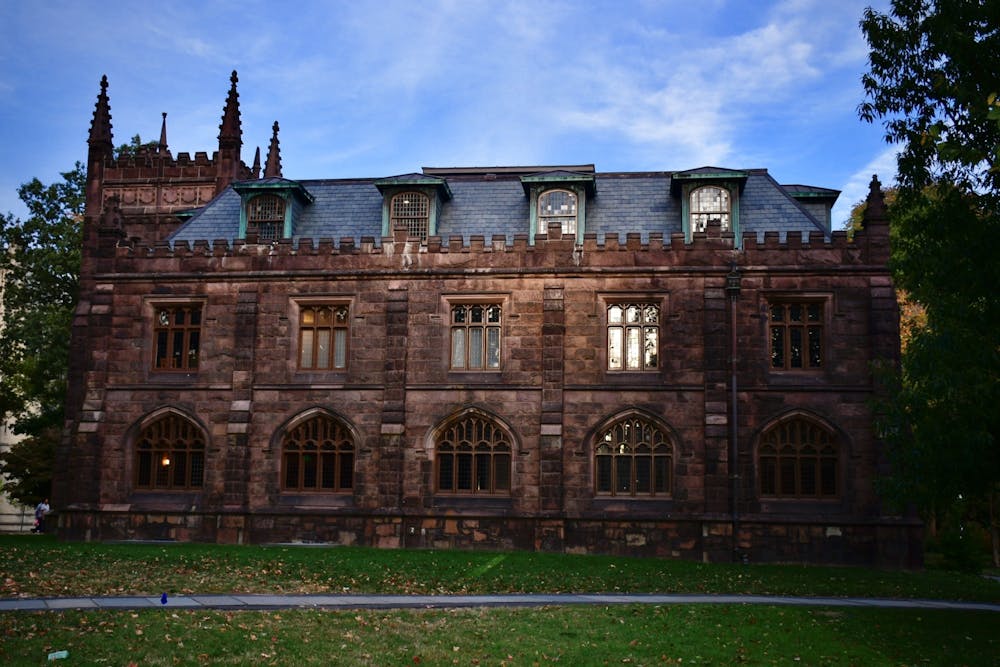Shallow, transactional, and forgettable: all words that come to mind at the thought of speed dating, particularly in the context of college relationships. Princeton’s Religious Life Council (RLC) is flipping this definition on its head as part of a larger initiative to foster interpersonal understanding on campus.
On the evening of Sept. 20, dozens of students turned out to Murray-Dodge Hall to participate in several rounds of short, prompted one-on-one conversations during one of the RLC’s signature events, “Speed Faithing.”
In different rounds, participants were asked to share the meanings behind their names, how faith factors into their lives, or their personal definition of love. How seriously participants took these questions was up to them.
“The questions are deep questions, but because you only have three minutes, we’ll just be silly about it for a minute, or maybe we’ll be really deep about it,” explained Matthew Weiner, an Associate Dean in the Office of Religious Life and adviser to the RLC.
“It’s an interesting question to figure out how to go about asking people what they really care about,” Weiner continued. “One way we do it is by being a little bit silly about it. The idea is inherently superficial.”
Naomi Frim-Abrams ’23, a member of the RLC tasked as a primary planner for Speed Faithing, expressed that sharing her religious interests in the context of an academic setting often leaves little room to voice personal narratives.
“I think starting to open those dialogues in places we don’t see them, or especially in academic spaces, is a hard one, because a lot of times you don’t want to be bringing subjective ideas into what you’re saying,” Frim-Abrams said.
Although it may seem like an unconventional method to listen and learn from others, Weiner believes that superficial conversations with strangers allow for vulnerability in a way that intimate conversations with loved ones do not always provide.

“I know this person really well, that’s the standard account of where I’m going to get deeper. But, maybe I’m scared because I’m going to be around [them] forever. Maybe, I’m going to be more guarded,” Weiner explained.
“If I just bumped into you in a café, in a town that both of us are passing through, [I] suddenly have the potential to be more open. So speed faithing is trying to get at a bit of that idea,” he continued.
While speed faithing allowed the RLC to reach out to the broader campus community, members of the group emphasized that internal events also create spaces of sharing and vulnerability.
One of three student organizers in the RLC, Isaac Wills ’23, reflected upon his experience building a strong foundation of trust in-person with the rest of the RLC. Their community-building primarily takes place during an annual retreat, which involves a week of spiritual reflection and bonding.

“I think what helps set the tone each year is the retreat, which really has been a profound experience for me,” Wills said. “The focal point of the retreat is this time called spiritual autobiographies.”
“Spiritual autobiographies” is an unstructured period of time where members of the RLC sit together mostly in silence for several hours, Wills explained. Whenever someone feels compelled, they can speak for as much time as they’d like about their life experiences with religion or spirituality.
Weiner explained how powerful “spiritual autobiographies” can be as a time for students to open up about private experiences.
“Since we spend 30 hours together and you only share your spiritual autobiography for 15 to 40 minutes, really what it’s about is being in silence together and then listening to somebody else,” he noted.
“The remarkable thing is people share the deepest, heaviest stuff that they’ve never shared [with] anybody before,” he continued. “Each time, someone shares something that feels life-threatening in the spiritual sense.”
Weiner added that the extended period of time that students spend together is a crucial part of the “spiritual autobiographies” exercise.
“Things that take time, actually take time. You don’t get to scale down getting a Ph.D. It takes more than a day, it takes seven years. If it took seven years to get a Ph.D., what makes you think you can have a deep spiritual experience by cutting it down?”
Apart from “Speed Faithing,” the RLC and ORL have been pushing forward other initiatives to foster interfaith understanding as the University returns to a fully in-person experience.
For Wills, the pandemic has highlighted the importance of fostering community.
“One of the big takeaways from COVID was [that] you can’t buy trust in a crisis,” he said.
Sejal Goud is a Features Contributor at the ‘Prince’. She can be reached at sejalgoud@princeton.edu.








